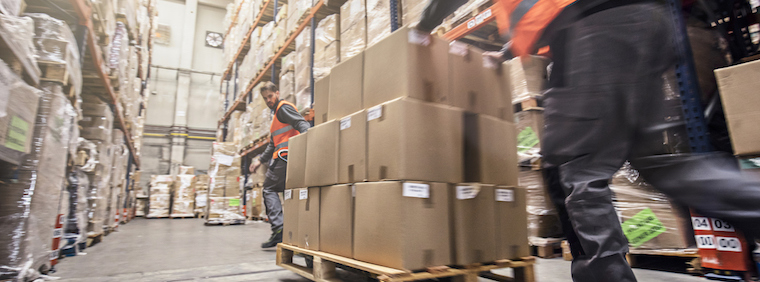Recently, we received an email* that asked one of those questions that make us realize that even simple words like “fulfillment” can be confusing to new small business owners. For others perhaps, the term can refer to some state of bliss achieved from a job well done. But for those who run a small business, the business term “fulfillment” is all about getting your product into the hands of your customers.
*Email us at [email protected]

What does the business term fulfillment mean?
Fulfillment is the process of getting products to customers who order them. (As in, “fulfilling an order.”) While the term “fulfillment” is simple to understand, it’s one of those “devil in the details” things a small business owner or manager discovers can be the business version of juggling buzz saws.
The pieces and parts of fulfillment
Historically, the term “packing warehouse” was used to define what is today called fulfillment house or fulfillment center (or in the U.K., fulfillment centre). The term fulfillment is attached to other points along the “supply chain” and can be associated with terms like “order fulfillment” or “product fulfillment.”
The term “fulfillment center” is used for the large warehouse structures where the logistics of processing and shipping products to customers take place.
Fulfillment comes in many flavors
There are several ways the word is used and there are various types of ways a company can access fulfillment services if their business involves the shipment of products, parts or other goods. Here are some examples.
- You sell products and outsource the fulfillment to a company that specializes in storing and shipping products for other companies. The term “drop shipper” or “drop shipping” is sometimes applied to such businesses.
- You fulfill your own orders, perhaps in your kitchen until it takes over the garage and guest room.
- You work with a larger version of a drop shipper and utilize the services of a logistics company that will handle your warehousing and fulfillment.
- You become a major manufacturer or retailer and you operate your own fulfillment center or networks of fulfillment centers.
- You become massive and not only handle the fulfillment of your own products, but you sell fulfillment services to other companies. (Example: Amazon Services.)
Outsourcing fulfillment vs. DIY shipping
There are clear benefits to packing and shipping your own orders: it’s flexible and cheap. For these reasons, businesses that are just starting out or businesses that have unique packaging needs, often choose to handle their own logistics.
And regardless of age or industry, any business that is struggling with cash flow will often be better off handling things in-house. Sometimes you have more time to spend than money.
But if your business is growing quickly and you have the cash on hand to outsource, you may be interested in exploring third-party warehousing and fulfillment. There are many logistics companies that will store your product, and take care of packing and shipping your orders.
How to choose a logistics company
If you want to hire a logistics company, the first thing you’ll probably do is head to Google. If you’re lucky, maybe you have a friend or colleague who can make a few recommendations. Now, how do you choose the right one?
1. Industry specialization
More than anything, it comes down to finding the right fit. Just like every e-commerce store functions a little bit differently, so does every fulfillment company. Many of them specialize in certain industries or types of business.
2. Their existing clients
Try to find a logistics company that already works with businesses similar to yours. This is particularly true for e-commerce merchants who have their own sets of needs.
Consider more than the price when selecting a fulfillment company
While price is important, finding a company that is a good fit is just as important. Many companies choose a provider based solely upon price, only to find out that quality is absent from the equation. This can be very painful when shipments are delivered without the proper items or are not delivered on time.
VIA (and for more information) | Shopify.com “Everything You Ever Wanted to Know About Third-Party Warehousing and Fulfillment“
istock
